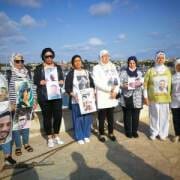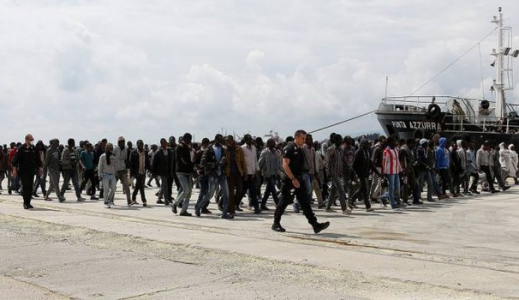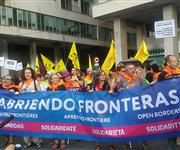They are being taken for a ride – Part 2
Today around 1,500 migrants landed again in Sicily, making a total of around 10,000 in the last days. It seems that, for the 400 who just arrived in Palermo, the wheels of fortune turned out well, as they will be transferred North, thereby running less risk of being intercepted by those who want to continue to profit from their voyage of hope.
Around 240 migrants landed in Messina, where the wheel of fortune will decide who will be designated to a structure in the North (the vast majority) and who will stay in Messina in the tent-city at Pala Nebiolo or in the barracks at Bisconte (around 50 “lucky ones” it seems).
And tomorrow morning all this will begin again in Trapani, with the landing of around 600 migrants, notwithstanding the difficulties to the prefecture caused by the high numbers of migrants disembarking, which is exceeding the spaces available in the province. So where will the migrants be actually welcomed?
The CARA* at Salinagrande was meant to be closed at the end of February; instead it remains open for an indefinite time, as there aren’t alternative complexes open to house asylum seekers. The centres in Trapani are full, and there isn’t a centre of initial welcoming, so either air transfers will be arranged to take people north, or people are destined to wander the city – as happened yesterday in Palermo – or worse they will be billeted to a random gym hall, as was the case in previous years in emergencies, but which has now become the rule.
And so those who arrive are still being taken for a ride, under the pretence of their needs being attended to, and days wiped away from memory, even though every day is a good day for the parade of politics, but never a good day to interest the parliament in what is actually happening on the ground, especially what’s taking place in Sicily. Here, all the humanitarian organizations appointed to safeguard the rights of migrants are being impeded from working in a calm and independent manner, where disused hotels, gyms and former institutions of public welfare (IPAB) are being renamed as welcome centres; and where the police stations are cutting funds for interpreters.
This last fact represents a huge problem, inasmuch as it increases the time it taks for the C3 form (request for international protection) to be sent to the office for immigration, with expectations now of about 4-5 months, even in the case of minors. The internal problems in any particular police department add to the difficulties caused by variations in practice between the different departments, between the different prefectures, and with the undervaluing of the associations set up for legal assistance – all of which, above all else, is having a knock-on effect on the psychology of the migrants whose proper rights are being denied.
All of this is accompanied by a defeatist attitude on the side of the directing authorities, who are tired of having to explain to the migrants the reasons for the slow pace of the bureaucracy, leaving them in a limbo without end, and frequently without legal support or mediation, a tunnel without exit. The situation becomes still more difficult and complicated in those CAS* and SPRARs* where the workers haven’t been paid for months, for whom their work is a dead weight, only aggravated by the seemingly presumptuous requests of their guests: “In Africa they wash themselves with cold water and here they want hot water; they live in huts, and here they want a bed with a frame; they want bottled water, but at home they drink from the river.”
But, without a shadow of a doubt, the biggest joke at the moment is the much vaunted increase in the number of territorial commissions, costing the government €2m (more than €200k for every new commission). This doubling of the numbers now looks like a flop, serving only to divide the designated allowance among the members of the commissions (highly coveted at €90 per seat).
The Commissions of Palermo are handicapped because the new members (especially the forces of law and order) are under-prepared, both in terms of knowledge of what’s going on, and in terms of technology (i.e. the use of computer programmes useful to the commission’s work), with the result that despite their establishment, the waiting time hasn’t changed.
Things are no better in Enna and Agrigento, where things still haven’t got off the ground (the new commission still needs to be formed) and in Trapani where the average waiting time is always around 18 months. Even there, according to the prefecture, the first results of the establishment of the new commissions won’t be seen for another six months/a year!
After the commission dates, the asylum seekers await the outcome. And it is in this field that the government is reaping the fruits of the ‘control’ which they’ve talked about before: the refusals are only increasing, and this only increases the number of days that the asylum seekers remain in the welcoming centres, with a correlate increase in public spending!
The facts speak clearly: in Sicily, 50% of the requests by asylum seekers from Gambia, Nigeria, Mali, Bangladesh and Pakistan are refused, with some provinces peaking at 60-70%. This has resulted in a number of appeals, which fortunately have been won in many cases. But at what cost?
The price paid is extremely high, but this is our system: on the one hand, we pretend to be welcoming (because it’s convenient to so many people) and on the other hand, through a Dantean journey, we create a mass of invisible people without rights, exploitable in so many ways, from the labour market to people trafficking or the criminal underworld.
Some have understood how it works, don’t want to be put on anymore and want to leave Italy, like Patrick, who has been living in the purgatory of our laws and hypocrisy for three years now, to the delight of Salvini & Co!
Alberto Biondo
Borderline Sicilia Onlus
*CARA: Hosting Centre for Asylum Seekers
*SPRAR: protection facilities for asylum seekers and refugees
Translation: Richard Braude




